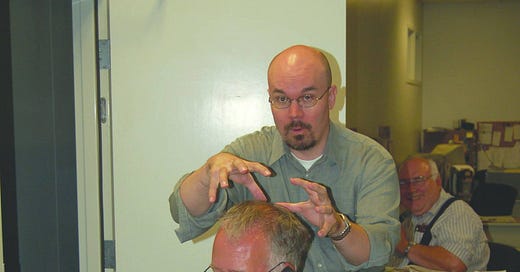Pranks can bring humor and levity to otherwise boring and forgettable daily life.
Movies and TV shows have portrayed them, and they have taken place in real life. The teen comedy Porky’s featured a phone prank scene where a girl got tricked into uttering a crude sexual word.
Real-life juveniles devised more elaborate senior pranks at the end of the school year at my alma mater, Palm Springs High School. I remember laughing after seeing a toilet planted outside the library in 1971, two years before I graduated.
A classmate who subscribes to my blog refreshed my memory about the senior prank in 1973 when all I recalled was dye in the swimming pool.
“Yes, I happened to be involved in the senior prank that year, along with about 50 other guys,” the classmate, who asked to remain anonymous, said in an email. He recalled they arrived after midnight and placed an outhouse atop the library. Inside the outhouse was a mannequin with a placard around its neck identifying it as the vice principal.
“We also took all the books out of the library and put them in his office so that when he opened his door, there was a wall of books,” he wrote. “We took all of the desks out of the classrooms in the English and History areas of the school and piled them up in the old gym. A couple of the desks got tossed into the pool as I remember.
“The whole affair was planned like a military operation that was very sophisticated for a bunch of 17 and 18 year olds. We had lookouts on the corners of the high school with walkie talkies, who would alert us if any police were in the vicinity. We also tried to make a pool out (in) the senior circle, but it leaked out. Took about 2-3 hours.”
Not everyone was amused. Some students were annoyed about being unable to use the swimming pool. A girl who sat next to me in my English class talked about reporting one of the culprits (not the one whom I quoted).
Put in its historical context, the senior prank in 1973 occurred a year after the Watergate break-in.
I befriended a prankster while attending California State University, Fullerton, four years later. Rumor has it that John impersonated Larry Flynt in a phone call to a student journalist after the Daily Titan reporter wrote a story about the Hustler publisher’s prosecution on obscenity charges. John and the duped student were sitting in the college newsroom at the time.
I reconnected with John 13 years later after seeing him quoted in a news report while he worked in public relations for an insurance company in Los Angeles. I attached my business card to a printout of the story and mailed it to him with a note that he would do anything to get his name in a newspaper. Within days he called my office but failed to convince me that he was Ronald Reagan.
In more recent times, impersonators punked then-Govs. Sarah Palin of Alaska and Scott Walker of Wisconsin, along with other public figures in phone calls.
The office telephone served as a prank tool for a former co-worker who got his jollies making phantom phone calls to my extension. He also liked to flash his laser pointer at my computer screen. He gathered business cards from a departed co-worker and placed them on my desk and the door handle of my car. He mailed the business cards in a plain envelope with no note or return address to my next employer.
His antics were juvenile, annoying and distracting, but I could treat the pain he caused by using Preparation H.
I have been the target in recent months of a prankster(s) with a vendetta. I received phone calls from CarShield and suspected something was amiss when other extended-warranty companies called, texted and emailed me. I never had contacted any of these companies, and CarShield would be the last one I’d do business with. The Federal Trade Commission notified consumers via email in July about a proposed $10 million settlement. It dealt with allegations that the company made misleading claims about what the service contracts cover, deceptively represented that consumers could get repairs at the shop of their choice, used deceptive celebrity and consumer endorsements, and violated the Telemarketing Sales Rule. CarShield relentlessly called me, using many phone numbers from the 636 area code. I blocked CarShield and filed complaints with DoNotCall.gov.
The perpetrator(s) likely filled out online contact forms that requested my name, phone number and email address. Companies and other entities apparently use these forms to reduce the likelihood of switchboard overload.
If that were not enough, I started getting phone calls from Christian colleges and seminaries, including Regent University and the Dallas Theological Seminary. I picked up their calls, and responded to emails and text messages by saying I was the victim of a vindictive prank. They were mostly apologetic and said they would unsubscribe me (I never subscribed in the first place).
I don’t know who is behind the vindictive pranks. I rule out a jilted girlfriend because I am unattached and have not had a recent breakup. Whoever is responsible has a lot of time on his or her hands and spends a lot of that time online. I have a lot of free time as well, but that is another story.




Likely initially just random computer run targeted solicitation. Then, if/when answering these calls, your META data is automatically listed and based on connection time(s), a value is assigned to your point of contact. This data (called Sucker Lists in the industry) is then sold to other call centers.
In short, you respond, either accidentally or to have 'fun' with a fraudster and you run the risk to be besieged by these kinda operators.
Single? How can that be? I signed you up for Prescott dating…